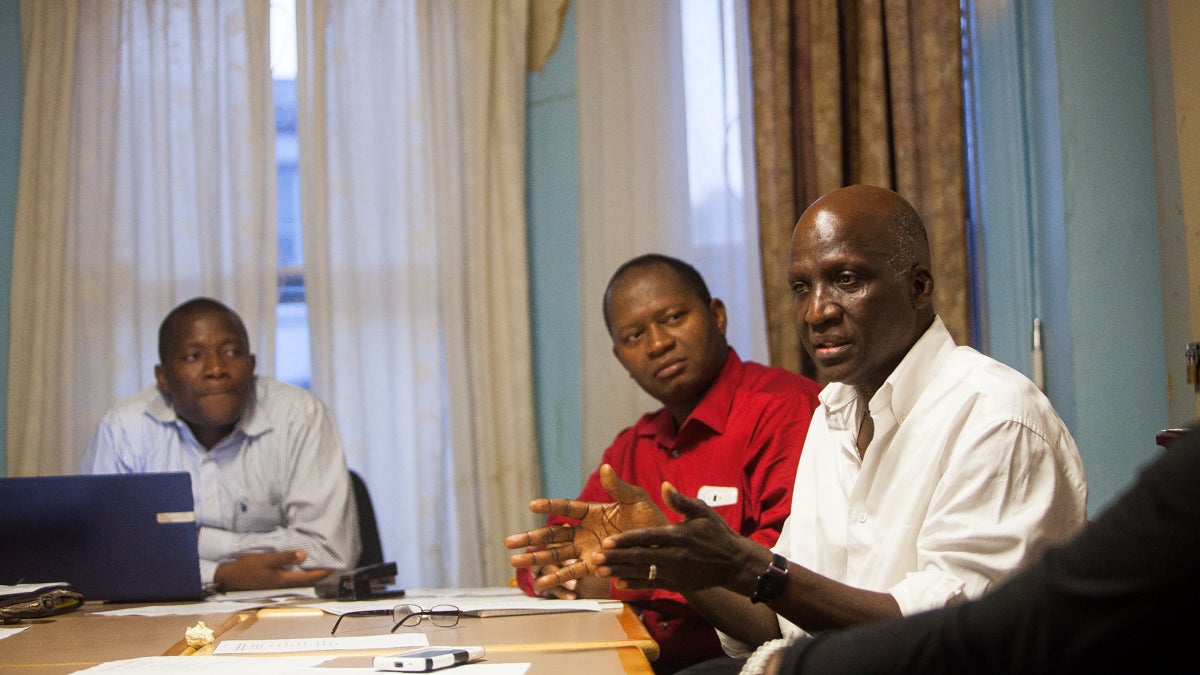Philly’s West African community leaders act to generate support, calm local fears on Ebola
Listen
Pastor Moses Dennis (left) chairs a coalition meeting of local West African leaders
About a dozen leaders, mainly from Philadelphia’s Liberian, Guinean and Sierra Leonean communities, hovered around a conference table inside the The African Cultural Alliance in West Philadelphia Monday evening.
It’s been a difficult time. Many have loved ones in Ebola-affected regions of Africa.
“It’s an emergency, so, as we move forward, we’ve been telling everyone that we sympathize, we emphasize. It’s time to be compassionate and do something concrete,” said Pastor Moses Dennis, president of the Liberian Ministers Association in Pennsylvania and chair of the group.
Leaders in Philadelphia’s West African communities say they’re mobilizing to better support responses to the Ebola outbreak in Liberia, Sierra Leone and Guinea. They’re also trying to address the impacts that the trauma abroad is having locally and even taking some extra cautious preventive health measures.
As they finalize a coordinated fundraising plan this week, they also want to curb fears about the disease and the potential stigma in immigrant communities.
The Rev. Joseph Koroma, president of the Christian Association of Sierra Leone in Philadelphia, said part of that means ensuring that every step is taken to protect themselves and others against the possibility of an Ebola case in Philadelphia.
“I think for our own interest, thinking of what happened in Texas, it’s good to be really, really proactive,” he said.
Some churches, including Koroma’s, are discouraging close contact with those just returning from countries with cases of Ebola, even if those travelers are sure they weren’t exposed to the virus. Such steps go against longstanding customs, especially when greeting new arrivals.
“Our community is very close, and we like to hug each other, especially in church,” said Koroma.
Koroma said the protocol is not intended to ostracize anyone. Quite the opposite; it’s meant to ensure the safety of that person and everyone around them, he said. Some recent arrivals are also voluntarily doing this, and even isolating themselves for 21 days before seeing loved ones. Twenty-one days is the period that Ebola could surface, if someone were exposed to it.
Coordinating the approach
The Liberian Ministers Association supports this and is drafting formal recommendations for its members. Church, they say, is often the first stop for new arrivals to the region, so they want to have a coordinated education effort.
“We’re trying to develop messages,” said the Rev. Solomon Muin, a leader of the group. “So that if there’s any new arrival, [we can] at least guide them through a process … to see how best we, along with them, can help protect ourselves, themselves and the global community we find ourselves in.”
The recommendations appear to go beyond guidelines from the Centers for Disease Control and Prevention. The CDC urges watching for fever and headaches and calling a doctor if symptoms arise. Health officials also stress Ebola is spread only through blood and bodily fluids of a person who is sick.
Even so, Dr. Brian Broker, a doctor in southwest Pennsylvania who’s involved with the state medical society, commends the group’s efforts.
“It’s a laudable goal that they have,” he said. “My perspective is we need to have more conversations about what measures are really sufficient.”
A representative of Philadelphia’s Department of Public Health was not available for comment on the ministers’ specific preventive recommendations, but the department has been in contact with many local groups, disseminating information. The department is referring to CDC guidelines.
In an email, CDC health communication specialist Germaine Vazquez clarified those CDC guidelines and said people can continue checking the CDC’s website for any new recommendations:
Even if not exposed to Ebola, travelers returning from Liberia and other Ebola affected countries are advised to take the following steps:
• Monitor your health for 21 days.
• During that time, you can continue your normal activities, including work.
• Seek medical care immediately if you develop fever and additional Ebola symptoms including severe headache, muscle pain, vomiting, diarrhea, stomach pain, or unexplained bleeding or bruising.
• If you develop symptoms of Ebola, it is important to stay apart from other people and to call your doctor right away.
• Call in advance to tell the doctor about your recent travel and symptoms before going to the office or emergency room. Advance notice will help the doctor provide care and protect other people who may be in the office.
At this time, these are CDC recommendations to anyone returning to the U.S. from the area where the Ebola outbreak is occurring. However, state and local health departments have their own public health authorities and can determine how to use isolation and quarantine to help protect the public’s health if needed.
Tune in to The Pulse this week for an extended version of this story.
WHYY is your source for fact-based, in-depth journalism and information. As a nonprofit organization, we rely on financial support from readers like you. Please give today.

